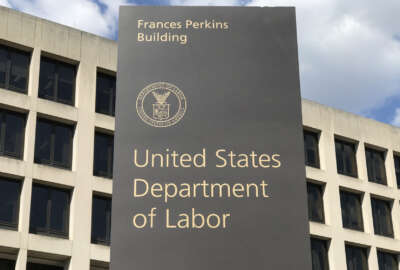Hubbard Radio Washington DC, LLC. All rights reserved. This website is not intended for users located within the European Economic Area.
A dispute over government audit rights in hybrid contracts
In cost-plus contracts, exactly how much of a contractor's records can the government see? And who in particular can see them? Those questions are at the heart ...
In cost-plus contracts, exactly how much of a contractor’s records can the government see? And who in particular can see them? Those questions are at the heart of a recent dispute among the Energy Department, HPM Corporation, and the Defense Contract Audit Agency. To shed light on the dispute, the Federal Drive with Tom Temin talked with Haynes Boone procurement attorney Dan Ramish.
Interview Transcript:
Tom Temin And this HPM contract that it had with the Energy Department was a hybrid. Parts of it were fixed price and parts of it were cost-plus. And so when DOE you wanted to see their internal records, it sounds like the company was worried that they would see the DOE would see their records concerned with the fixed price, which is none of the government’s business. Is this what the crux of this is all about?
Dan Ramish That’s right. Tom HPM had a hybrid contract and the government thought it was entitled to see both costs on the cost side of the House and on the fixed price side of the House. And the board didn’t totally respect that line of separation, which they should have under the FAR clauses in question. There was a specialty agency clause that could have been the basis for the holding, but the board went further and kind of muddied the water as to what records the government could get.
Tom Temin The defense contract Audit Agency was the adjudicator here. Why was DCAA involved in a civilian contract or was it with one of the energy labs concerned with nuclear stuff?
Dan Ramish So sometimes civilian agencies will bring in DCAA to serve as an auditor because of its expertise in that area, even though the contract is with civilian agencies. So in 2019, DOE did that with HPM. HPM here was a contractor providing occupational medical services at a Hanford site in Washington.
Tom Temin Right. And there’s a fourth agency that I didn’t bring in, which is the one that decided this is the civilian Board of Contract Appeals. DCAA and DoE were sort of in cahoots. HPM didn’t like what they were doing between those two and took it to the civilian Board of Contract Appeals.
Dan Ramish That’s right. So we actually talked about this over the summer Tom. There was a question about non-monetary claims. So this is a non-monetary claim by the contractor. DoE was seeking cost records on the fixed price part of the hybrid contract. There were actually two different audits. One of them was performed by DCAA in 2019, and then the auditor, Cohn Resnick, audited their 2020 contract records and DoE’s contracting officer said, Hey, I want to see everything that you’re providing to the auditors. And HPM said, No, these are proprietary company records. The records that relate to the fixed price part of the contract you don’t have any business seeing. Just as you say, there isn’t a right under the contract clauses. And so this resulted in a nonmonetary claim submitted to the DoE contracting officer. The contracting officer denied the claim and said that DoE was entitled to the records on a fixed price side as well. And at that point the contractor appealed to the Civilian Board of Contract Appeals.
Tom Temin And the records were to be supplied to DoE by the Defense Contract Audit Agency.
Dan Ramish Well, this was another kind of line of argument here. Dio said that the contractor had to directly provide the records to the agency contracting officer, and HPM said, Well, to the extent that DCA needs to provide or determines that DoE. has a need to know some of this information, we’re okay with them passing it on, but we don’t have an obligation to provide it to DoE.
Tom Temin But DoE said we have the need to see everything. So DCAA said okay,.
Dan Ramish Yes. And that’s not an uncommon stance from the government’s auditors, certainly.
Tom Temin Sure. Well, dealing with another fellow government agency, they’re almost in cahoots. We’re speaking with Dan Ramish. He’s a procurement attorney at Haynes Boon. So what did the Civilian Board of Contract Appeals actually decide then?
Dan Ramish So the Civilian Board of Contract Appeals first had to decide whether this was a valid nonmonetary claim. So most claims are for money damages under the Contract Disputes Act. And the agency here said, well, this is really a monetary claim because based on the denial of access to these fixed price cost records, we’re going to remove all unsupported costs from the contractors, indirect costs, and provisional billing rates. And at the end of the day, this is about that money and whether we’re entitled to recoup a portion of it or deny paying it. And the Civilian Board said, well, that’s not really the case. This deals with a matter of contract performance. If we decide in the contractors favor, they don’t have to provide these records. That’s an adequate basis for supporting a non-monetary claim. It’s a significant, non-monetary consequence of the claim. So the board said we have jurisdiction over this non-monetary issue. Then they looked at the contract and the government’s audit rights under the contract, and there were three different clauses. Two of them are standard clauses that address the government’s right to access records, the allowable cost and payment clause, which is for flexibly price contracts, cost-plus contracts, and time and materials contracts and other flexibly priced contracts, and then the audit and records negotiations clause, which provides different audit rights. But the audit rights at issue under that clause related to flexibly placed contracts. And then there was a third clause that specifically DEAR or Department of Energy clause 975.2043, which the agency said, Well, this clause also provides us access to those records. And the contractor disagreed. HPM said the two standard clauses from the FAR are only applicable to the cost type part of this hybrid contract, not the fixed price contract. When you have a fixed price, part of a contract that’s treated totally separately on these hybrid contracts and there’s no audit rights extending to the fixed price part. And then they said as to the Department of Energy Clause, that was really intended for environmental and health and safety type records and not just anything under the contract. And the board disagreed across the board with the contractor’s position. They said that the DEAR clause, even though it may be sort of intended for environmental, health and safety records, that the language of the clause gives the government broad rights to access different types of records without those kinds of restrictions. So they could have stopped there and said, we will dismiss the appeal for failure to say the claim because this specialty DoE clause provides access to the records the government wants. But instead the board said, Actually, we’re not prepared to say that the standard allowable cost and payment clause or the order records clause don’t allow the government access to any records on the fixed price part of the contract.
Tom Temin So therefore the government would have the right to the records under the fixed price part of the contract.
Dan Ramish That’s right. The board said all three of these clauses potentially grant access to the fixed price records, and that’s a big problem because there really is a line of demarcation. This is a fundamental aspect of fixed price contracting that the government doesn’t have unless you’re talking about a certified cost for pricing data scenario, which it was clear was not the case here. Other than that scenario, the government doesn’t have the right to access cost records on fixed price contracts, and a fixed price claimed on a hybrid contract is the same thing.
Tom Temin What would motivate an experienced contracting officer in the first place to think they can have records on a fixed price contract in the first place?
Dan Ramish That’s a great question. So HPM had a theory about why DoE wanted these cost records on the fixed price part. They said that DoE wasn’t requesting the costs to verify the costs, that they were properly accounted for, but they actually wanted the information to assist in a new follow on contract solicitation for the fixed price services that HPM was providing. So they wanted the cost data to be able to compete with other contractors.
Tom Temin Yeah, that’s really on the edge of kosher though, isn’t it?
Dan Ramish The board looked at it and they weren’t sympathetic to the contractor, but I think most contractors would get pretty up in arms over that. The notion that the government is both overreaching and demanding cost records on a fixed price contract without an appropriate right of access, and also that they’re doing it for this kind of nefarious purpose.
Tom Temin Yeah. So did DoE get those records?
Dan Ramish At the end of the day, the Civilian Board of Contract Appeals did dismiss the appeal. So DoE would have had the ability to get the records or they could take the remedies they were talking about and recoup some of the costs or deny paying some of the contractors indirect costs.
Tom Temin So the lesson for contractors is don’t do fixed price work for the Department of Energy thinking they can’t go fishing and hunting in your internal records.
Dan Ramish Well, Tom, I think there’s a good argument to be made that the language about the standard audit and records clauses and the allowable costs and payment clauses wasn’t really necessary to the holding. The Civilian Board could have just kept it to the specialty DoE clause. So I think that’s the position the contractors will likely take in future disputes. But any time, you know, boards kind of stray from the standard interpretation of FAR clauses, it creates uncertainty and confusion and risk for contractors.
Copyright © 2024 Federal News Network. All rights reserved. This website is not intended for users located within the European Economic Area.
Tom Temin
Tom Temin is host of the Federal Drive and has been providing insight on federal technology and management issues for more than 30 years.
Follow @tteminWFED





